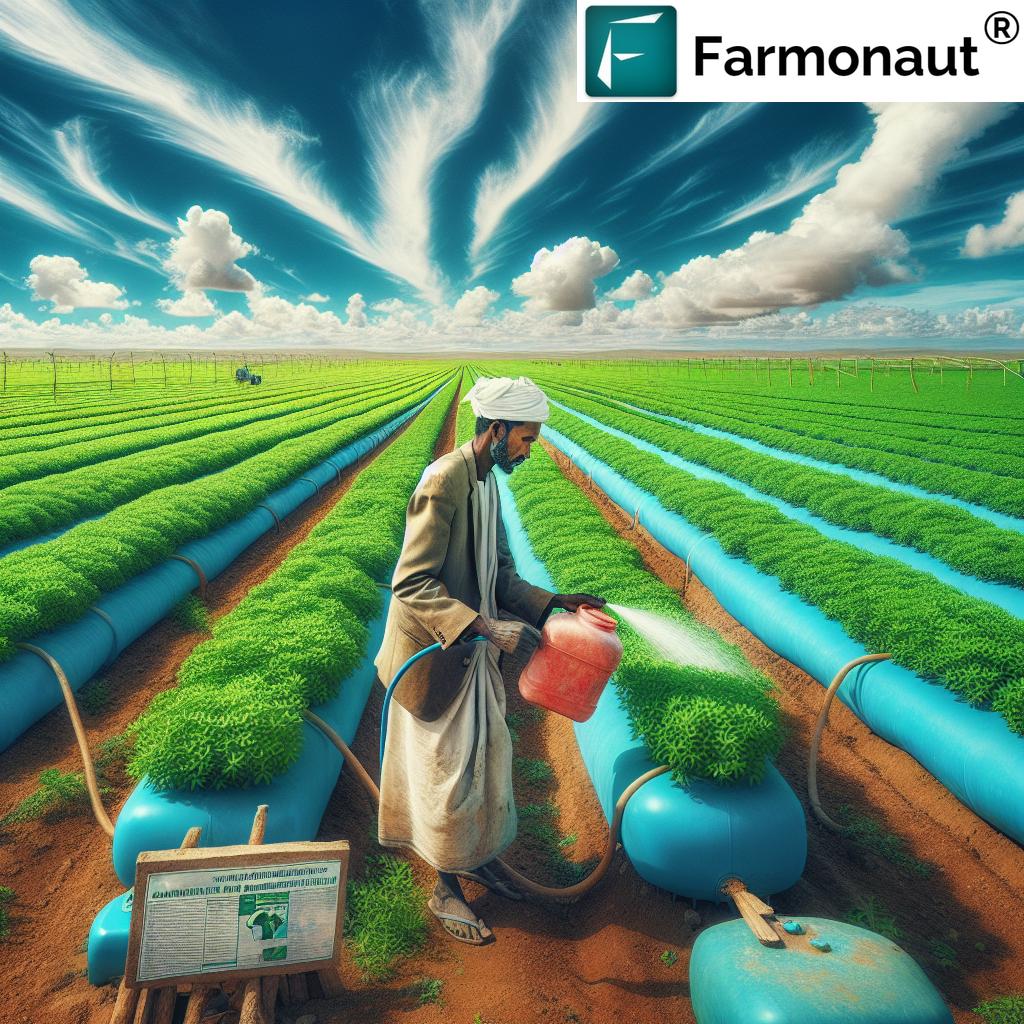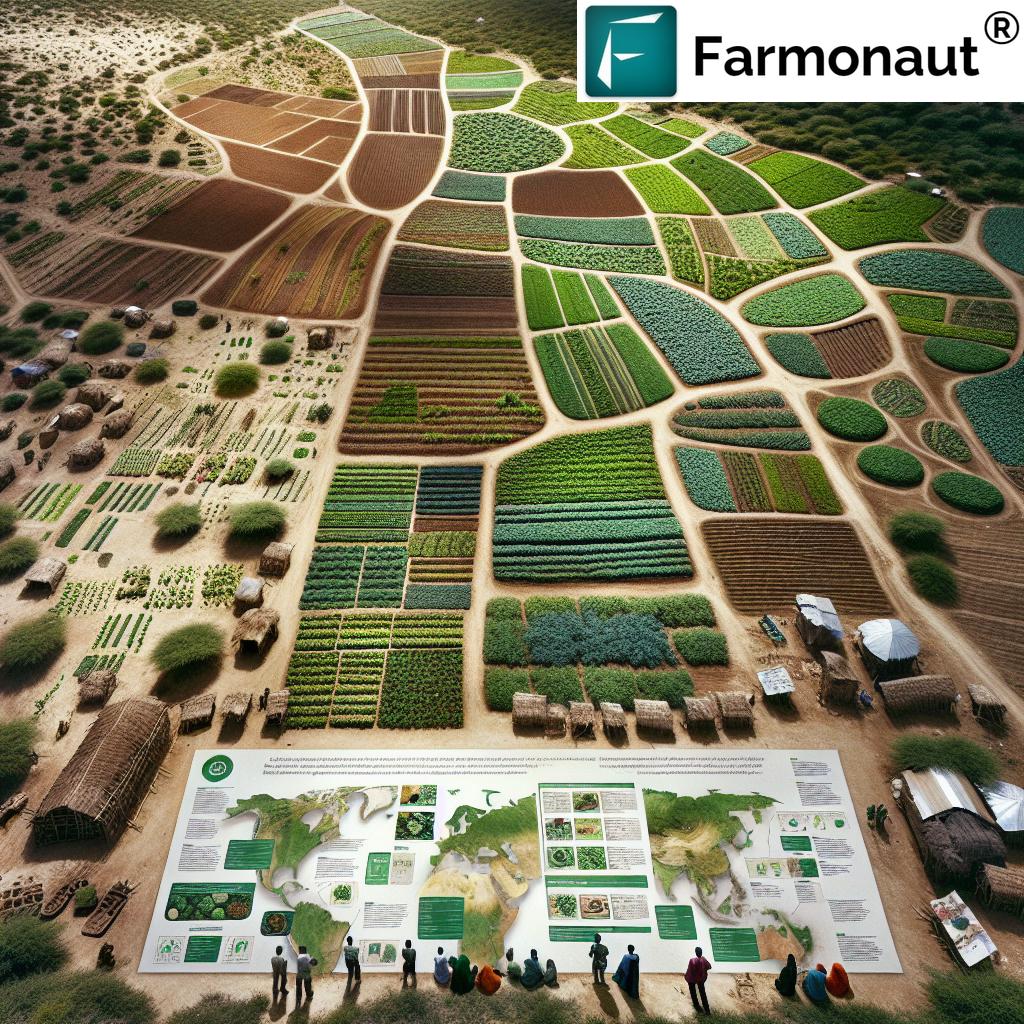Somalia’s Agricultural Revolution: Lifting the Fertilizer Ban to Boost Sustainable Farming and Food Security
“Somalia’s agriculture sector contributes significantly to its GDP, with the recent fertilizer ban lift expected to boost crop yields.”
In a groundbreaking move that promises to reshape Somalia’s agricultural landscape, we’ve witnessed a significant shift in policy that could revolutionize farming practices and bolster food security across the nation. The Somali government’s recent decision to lift the ban on chemical fertilizers marks a pivotal moment in the country’s ongoing efforts to combat food insecurity and mitigate the devastating effects of climate change on its vital farming sector.
As we delve into this transformative policy change, we’ll explore its far-reaching implications for Somalia’s economy, environment, and the livelihoods of millions who depend on agriculture. This blog post will provide a comprehensive analysis of the factors leading to this decision, the potential benefits and challenges, and the strategies being implemented to ensure sustainable growth in the agricultural sector.

The Context: Somalia’s Agricultural Challenges
To understand the significance of this policy shift, we must first examine the context in which it occurs. Somalia, a country where agriculture forms the backbone of the economy, has long grappled with a myriad of challenges that have hindered its agricultural productivity:
- Climate Volatility: Frequent droughts and erratic rainfall patterns have severely impacted crop yields, leading to food shortages and economic instability.
- Soil Degradation: Years of unsustainable farming practices have depleted soil nutrients, reducing the land’s capacity to support robust crop growth.
- Pest Infestations: Desert locust swarms have periodically devastated crops, further exacerbating food insecurity.
- Inadequate Infrastructure: Limited access to modern farming technologies and poor irrigation systems have hampered agricultural efficiency.
These challenges have collectively contributed to a precarious situation where a significant portion of Somalia’s population relies on humanitarian aid for sustenance. The urgent need for self-sufficiency in food production has become increasingly apparent, prompting the government to reassess its agricultural policies.
The Fertilizer Ban Lift: A Game-Changer for Somali Agriculture
The decision to lift the ban on chemical fertilizers represents a watershed moment in Somalia’s agricultural policy. This move, announced by the cabinet in Mogadishu, is poised to have far-reaching effects on the country’s farming sector. Here’s why this policy shift is so crucial:
- Boosting Crop Yields: Chemical fertilizers have the potential to significantly increase agricultural productivity by providing essential nutrients to crops, leading to higher yields per hectare.
- Soil Replenishment: The reintroduction of fertilizers will help replenish depleted soils, restoring their fertility and capacity to support diverse crops.
- Economic Growth: Improved agricultural output is expected to foster economic growth in rural areas, where a large portion of the population depends on farming for their livelihood.
- Reducing Food Imports: Enhanced domestic production could reduce Somalia’s reliance on food imports, strengthening food security and national self-sufficiency.
- Climate Change Resilience: By increasing crop yields and soil health, the use of fertilizers can help build resilience against climate-related disruptions to agriculture.
The government’s decision aligns with successful models implemented in neighboring countries like Ethiopia and Kenya, where regulated fertilizer use has contributed to agricultural prosperity and improved food security.
Balancing Productivity and Sustainability
While the lifting of the fertilizer ban presents significant opportunities, it also raises important questions about environmental sustainability. The Somali government recognizes the potential risks associated with chemical fertilizers, such as soil degradation and water contamination. To address these concerns, a comprehensive strategy is being developed to ensure responsible and sustainable use of fertilizers:
- Regulatory Framework: Strict regulations will be implemented to govern the use of chemical fertilizers, preventing overuse and misapplication.
- Farmer Education: Technical training programs will be provided to farmers, equipping them with the knowledge and skills needed to use fertilizers effectively and responsibly.
- Promotion of Sustainable Practices: The government will encourage the adoption of sustainable farming practices alongside fertilizer use, including crop rotation, conservation tillage, and integrated pest management.
- Research and Development: Investments in agricultural research will focus on developing climate-smart agriculture techniques and identifying optimal fertilizer formulations for different soil types and crops.
By implementing these measures, Somalia aims to strike a balance between boosting agricultural productivity and preserving its natural resources for future generations.
“Somalia’s agricultural policy shift is inspired by successful models in Ethiopia and Kenya, aiming to improve food security for millions.”
The Role of Technology in Somalia’s Agricultural Revolution
As Somalia embarks on this new chapter in its agricultural development, the integration of modern technology will play a crucial role in maximizing the benefits of the fertilizer ban lift. Advanced agricultural technologies can help farmers make informed decisions about fertilizer application, crop management, and resource allocation.
One such innovative solution is offered by Farmonaut, a pioneering agricultural technology company that provides satellite-based farm management solutions. Through its platform, Farmonaut offers real-time crop health monitoring, AI-based advisory systems, and resource management tools that can significantly enhance the efficiency and sustainability of farming practices.
Key features of Farmonaut’s technology that could benefit Somali farmers include:
- Satellite-based crop health monitoring for precise fertilizer application
- AI-driven personalized farm advisory for optimal resource management
- Weather forecasting to help farmers make informed decisions about planting and harvesting
- Soil moisture analysis to improve irrigation efficiency
By leveraging such advanced technologies, Somali farmers can maximize the benefits of chemical fertilizers while minimizing environmental impact.

Comparative Analysis of Agricultural Practices in Somalia
| Agricultural Practice | Estimated Crop Yield (tons/hectare) | Environmental Impact | Water Usage (liters/hectare) | Soil Health Impact | Climate Resilience |
|---|---|---|---|---|---|
| Traditional Farming without Fertilizers | 1-2 | Low | 5000-7000 | Poor | Low |
| Farming with Chemical Fertilizers | 3-5 | High | 8000-10000 | Moderate | Medium |
| Sustainable Farming with Regulated Fertilizer Use | 4-6 | Medium | 6000-8000 | Good | High |
| Climate-Smart Agriculture Techniques | 5-7 | Low | 4000-6000 | Good | High |
This table illustrates the potential benefits of adopting sustainable farming practices with regulated fertilizer use, combining the yield benefits of chemical fertilizers with improved environmental outcomes and climate resilience.
Challenges and Opportunities Ahead
While the lifting of the fertilizer ban presents significant opportunities for Somalia’s agricultural sector, several challenges must be addressed to ensure its success:
- Infrastructure Development: Improving rural infrastructure, including roads and irrigation systems, will be crucial for efficient fertilizer distribution and application.
- Access to Credit: Many farmers may need financial support to purchase fertilizers and other agricultural inputs. Developing accessible credit systems will be essential.
- Market Access: Ensuring that increased crop yields translate into better market access and fair prices for farmers will be critical for sustained economic growth.
- Climate Change Adaptation: Continued efforts to develop drought-resistant crops and implement water conservation techniques will be necessary to build long-term resilience.
Despite these challenges, the opportunities presented by this policy shift are immense. By embracing sustainable farming practices and leveraging modern agricultural technologies, Somalia has the potential to transform its agricultural sector, enhance food security, and drive economic growth.
The Path Forward: Integrating Technology and Sustainable Practices
As Somalia moves forward with its agricultural revolution, the integration of technology and sustainable practices will be crucial. Here’s how these elements can work together to create a more resilient and productive farming sector:
- Precision Agriculture: Utilizing satellite imagery and data analytics to optimize fertilizer application and resource use. Farmonaut’s satellite-based crop health monitoring system can play a significant role in this aspect.

- Climate-Smart Techniques: Implementing practices like conservation tillage, crop rotation, and agroforestry to enhance soil health and climate resilience.
- Water Management: Adopting efficient irrigation systems and water conservation techniques to maximize the benefits of fertilizer use while minimizing environmental impact.
- Digital Farming Tools: Leveraging mobile apps and AI-powered advisories to provide farmers with real-time information and guidance. Farmonaut’s mobile apps for Android and iOS offer these capabilities.


- Capacity Building: Investing in farmer education and training programs to ensure widespread adoption of best practices in fertilizer use and sustainable farming.
By embracing these approaches, Somalia can create a more sustainable and productive agricultural sector that is resilient to climate change and capable of meeting the food security needs of its growing population.
The Role of Data in Sustainable Agriculture
In the era of digital farming, data plays a crucial role in driving sustainable agricultural practices. Accurate and timely data can help farmers make informed decisions about fertilizer application, irrigation, and crop management. This is where technologies like those offered by Farmonaut become invaluable.
Farmonaut’s satellite-based monitoring system provides farmers with essential data on crop health, soil moisture, and other critical metrics. This information can be used to optimize fertilizer use, ensuring that crops receive the right amount of nutrients at the right time, thereby maximizing yields while minimizing environmental impact.
For developers and researchers looking to integrate this valuable data into their own systems, Farmonaut offers an API that provides access to satellite and weather data. This can be particularly useful for creating custom solutions tailored to Somalia’s specific agricultural needs. Learn more about Farmonaut’s API
Additionally, for those interested in developing applications using Farmonaut’s data, comprehensive documentation is available. Check out the API Developer Docs
Conclusion: A New Era for Somali Agriculture
The lifting of the fertilizer ban in Somalia marks the beginning of a new era in the country’s agricultural sector. By embracing chemical fertilizers while simultaneously promoting sustainable farming practices and leveraging advanced technologies, Somalia is poised to significantly boost its agricultural productivity, enhance food security, and stimulate economic growth in rural areas.
However, the success of this initiative will depend on careful implementation, ongoing research, and a commitment to environmental stewardship. As Somalia moves forward, it will be crucial to monitor the impacts of increased fertilizer use, continue to invest in farmer education and training, and adapt policies as needed to ensure long-term sustainability.
The road ahead may be challenging, but with the right approach, Somalia has the potential to transform its agricultural sector, becoming a model for sustainable development in the region. By combining traditional knowledge with modern technology and sustainable practices, Somalia can build a resilient and productive agricultural system that will benefit generations to come.
Frequently Asked Questions
- Q: Why did Somalia lift the ban on chemical fertilizers?
A: Somalia lifted the ban to boost agricultural productivity, enhance food security, and combat the effects of climate change on farming. - Q: What are the potential benefits of using chemical fertilizers in Somalia?
A: Benefits include increased crop yields, replenished soil nutrients, improved food security, and potential economic growth in rural areas. - Q: How will the government ensure sustainable use of fertilizers?
A: The government plans to implement strict regulations, provide technical training to farmers, and promote sustainable farming practices alongside fertilizer use. - Q: What role can technology play in Somalia’s agricultural revolution?
A: Technology like satellite-based crop monitoring, AI-driven advisories, and precision agriculture tools can help optimize fertilizer use and improve overall farm management. - Q: How might the fertilizer ban lift impact Somalia’s environment?
A: While there are concerns about potential soil and water contamination, the government aims to mitigate these risks through regulated use and promotion of sustainable practices.



